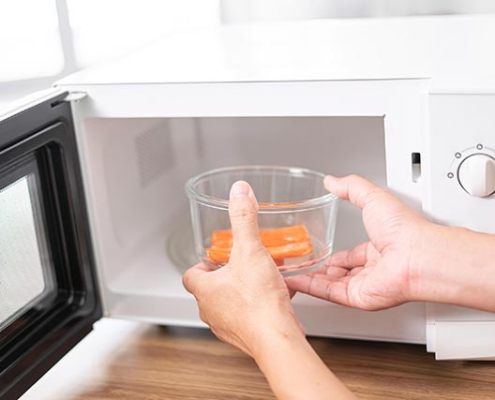Troubleshooting Microwave Turntable Issues
 At the heart of a microwave’s functionality is its turntable, ensuring even heating and cooking by rotating the food throughout the cycle. However, when the turntable encounters issues, it can lead to unevenly cooked meals and frustration. Understanding the common problems that can prevent a microwave’s turntable from spinning is the first step toward troubleshooting and finding a solution.
At the heart of a microwave’s functionality is its turntable, ensuring even heating and cooking by rotating the food throughout the cycle. However, when the turntable encounters issues, it can lead to unevenly cooked meals and frustration. Understanding the common problems that can prevent a microwave’s turntable from spinning is the first step toward troubleshooting and finding a solution.
This article aims to explore various causes behind turntable malfunctions, from simple obstructions to more complex internal issues, and provide practical advice on diagnosing and fixing these problems.
Article Summary:
- Your Microwave Turntable: How It Works
- Common Symptoms of Turntable Failure
- Step-by-Step Guide to Diagnosing Turntable Problems
- DIY Fixes for Minor Turntable Issues
- Professional Appliance Repair: When and Why to Call in Experts
- Atlanta Microwave Repair
1. Your Microwave Turntable: How It Works
The turntable mechanism within a microwave is a great example of simple yet effective engineering, designed to ensure that your food is heated evenly. At the heart of this functionality is a synchronous motor, a component known for its reliability and precision in rotating the turntable at a rate that matches the frequency of the AC power supply. This ingenious use of a synchronous motor allows the turntable to maintain a consistent speed, crucial for even cooking.
2. Common Symptoms of Turntable Failure
When the turntable fails to rotate, it does more than just stop your food from spinning. It immediately affects the microwave’s overall functionality and performance. Some common symptoms of turntable failure include:
- The turntable not rotating at all or rotates intermittently
- The turntable turning too fast or too slow
- Loud grinding noises when the turntable is in operation
These problems can be caused by various factors, from simple mechanical issues to more complex electrical faults. It’s essential to understand the root cause of the problem before attempting any DIY fixes or calling in a professional appliance repair company.
3. Step-by-Step Guide to Diagnosing Turntable Problems
Here’s a step-by-step guide to diagnosing problems with your microwave’s turntable:
- Check the Power Source: Ensure the microwave is properly connected to a working power outlet. While it may sound like an obvious first step, a loose or damaged power cord can interrupt the function of the turntable.
- Examine the Turntable Assembly: Verify that the glass plate is correctly positioned on the turntable support and that none of the wheels on the roller guide are missing or broken. Something as simple as incorrect assembly can prevent the turntable from rotating.
- Clear Obstructions: Look for any obstructions that may be hindering the rotation of the turntable. Small food particles or debris stuck in the roller guide or underneath the turntable can impede movement. Do not underestimate the importance of cleaning your microwave regularly!
- Inspect the Drive Coupling: The drive coupling connects the motor to the turntable and can sometimes wear out or become damaged. Check if it’s properly aligned and intact. If it shows signs of wear or damage, it may need replacement.
- Test the Turntable Motor: If the turntable still doesn’t rotate after checking the above components, the issue might lie with the motor. Disconnect the appliance from power and remove the bottom panel to access the motor. Using a multimeter, check for continuity. No continuity indicates a defective motor that needs replacing.
- Evaluate the Control Board: The control board regulates power to the turntable motor. If other functions of the microwave work but the turntable doesn’t, the control board could be at fault. This requires professional assessment due to the complexity of microwave electronics.
By following these steps, homeowners can identify the source of most turntable issues in their microwaves. For problems related to the control board or when in doubt, seeking professional appliance repair services is recommended to avoid further damage or safety risks.
4. DIY Fixes for Minor Turntable Issues
For homeowners encountering minor issues with their microwave’s turntable, there are several DIY fixes that could restore proper functionality without the need for professional intervention.
Firstly, ensuring that the microwave is placed on a stable, level surface can prevent operational disruptions often mistaken for internal malfunctions. Additionally, as mentioned above cleaning your microwave plays a crucial role! Dust, food particles, and other debris can accumulate around the turntable’s motor or on the roller guide, impeding smooth rotation. Gently wiping these components with a soft, damp cloth can remove obstructions.
If the issue persists, inspecting the turntable’s drive bushing – the plastic mechanism that turns the plate – for damage or misalignment is advisable. This component, when worn out or improperly positioned, can cause the turntable to malfunction. In such cases, carefully realigning or replacing the bushing according to the manufacturer’s instructions can effectively solve the problem, ensuring your microwave heats your meals evenly once again.
5. Professional Appliance Repair: When and Why to Call in Experts
 Despite the allure of DIY repairs, certain microwave turntable issues necessitate the expertise of professional appliance repair technicians. Complex problems beyond simple obstructions or misalignments—such as electrical faults, control board issues, or motor failures—require a level of expertise and safety considerations that only professionals can provide.
Despite the allure of DIY repairs, certain microwave turntable issues necessitate the expertise of professional appliance repair technicians. Complex problems beyond simple obstructions or misalignments—such as electrical faults, control board issues, or motor failures—require a level of expertise and safety considerations that only professionals can provide.
If you’re wondering if it’s better to repair or replace a broken microwave, consider calling experts. Professionals not only bring years of experience but also have access to the specific tools and genuine replacement parts needed to ensure a durable and safe repair. Furthermore, attempting to fix complex issues without the proper knowledge can lead to further damage or even void the appliance’s warranty.
By choosing expert repair services at the first sign of serious trouble—like sparks, smoke, unusual noises, or when the microwave ceases to function altogether—you’re investing in the longevity of your appliance and the safety of your household.
6. Atlanta Microwave Repair
For microwave repair in Atlanta and the surrounding communities, call us at Comfort Appliance Repair. Our team of knowledgeable, certified repair technicians is equipped to handle all your microwave turntable issues promptly and effectively. We prioritize customer satisfaction and safety above all else, offering reliable repairs at competitive prices. Don’t let a malfunctioning turntable interrupt your daily life; contact us for expert microwave repair services today!
By Dennis Godynuk, Owner of Comfort Appliance Repair
Dennis Godynuk is the owner of Comfort Appliance Repair in Covington, GA. Comfort Appliance provides fast and reliable repair services for all major household appliances. Dennis and his team of experienced technicians can tackle any problem, from broken refrigerators to malfunctioning dishwashers, and their prices are very competitive. Customers can rest easy knowing that their appliances are in good hands when they call Comfort Appliance Repair.


